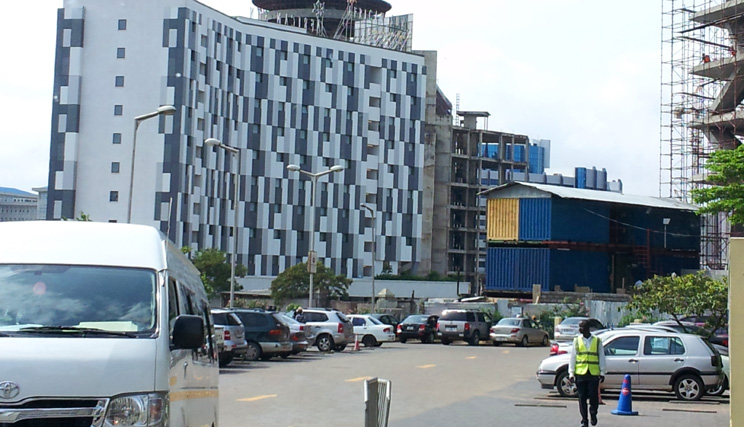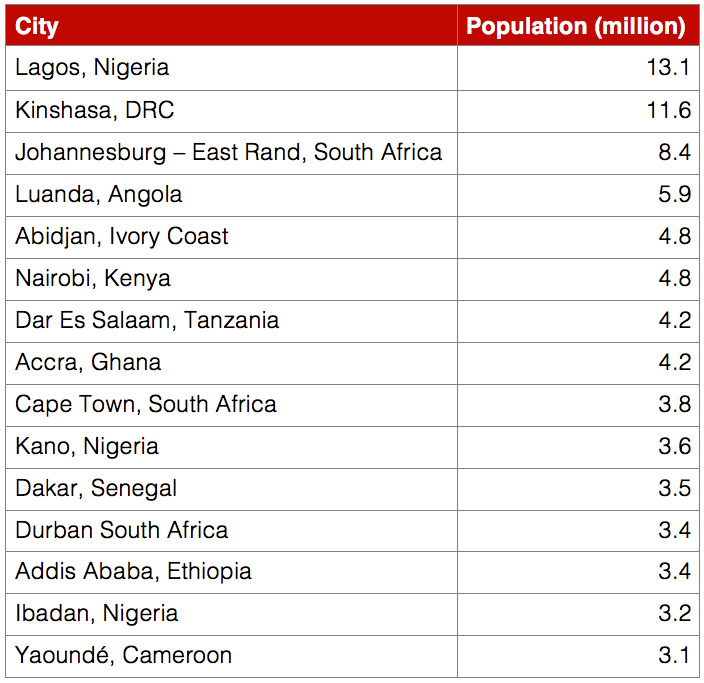Caught in the midst of traffic at Lagos after attending a discussion about the electricity challenges in Nigeria, I told my driver about how smart cities would improve people’s lives. He gave me a skeptical look, which I interpreted as “will I ever see this come true…?”

I read recently an article about strategies for smart cities in Africa (Slavova, Mira & Ekene Okwechime. 2016. “African smart cities strategies for Agenda 2063” Africa Journal of Management, 2: 210-229.)
I thought of sharing with you some of their insights. But let me first show some figures. The World Atlas lists the populations of 150 largest cities in the world. Out of these, 15 are located in sub-Saharan Africa (figures in million people):
It’s not difficult to figure out the main challenges African cities face. If you’ve lived there, you can name them in a few seconds:
- Inadequate physical infrastructures
- Too widespread populations
- Unemployment
- Slums
- Poor quality social services
- Vulnerability to disasters and climate change…
The good news is that there are ways to overcome these challenges. For instance, some of the largest cities’ current infrastructures are not well suited to meet the needs of citizens. But those infrastructures could be transformed to have a new functionality. An example: Lagos has two stadiums next to each other, one of which is underutilized. Couldn’t this one be transformed into a transport terminal?
Small cities have the opportunity to become smart as they grow — not to say about satellite cities that are being built next to some of the largest ones. Hope City in Ghana is one such satellite city next to Accra. Someone described it to me as a “new city within the city.” This is a promising route: one more aspect in which Africa can leapfrog.
However, technology per se doesn’t make a city smart. I liked this sentence in particular: “The centrality of ‘smart citizens’, rather than ‘smart cities’, can be easily overlooked.” A high-tech city may not be that smart if citizens don’t behave smartly. At the same time, an improvement in living conditions will help promote smart behaviors.
Related posts



This is an impressive scholarly conservation, Africa! Thank you!
Last week, I followed the intra-trade conference in Kigali, Rwanda. At some stage, during the conference, the issue of building “smart cities” came up … and was impressive to hear how Rwandan officials are working hard to (re)create a smart city outside the capital Kigali that will be well-equipped with modern-art infrastructures, free from pollution and slums, and congestion – a new city within the city. An alternative dream … a new city within the city … is currently been pursued by the current Tanzanian President, John Pombe Magufuli, to move the capital from the congested city of Dar es Salaam to Dodoma. The vision for Dodoma as articulated by Magufuli is exactly what your blog is saying today: promote smart and good behaviour, manage human creation challenges – slums, pollution, traffic congestion etc…
I missed your regular blog, but glad to see it again!
Aloys
Thank you, Aloys. I think it’s important not to lose sight that the creation of those new cities should not overlook the need to offer affordable, decent housing for the millions of people who live in subhuman conditions. Both types of projects whould advance in parallel. I’m glad to know that this is how Tanzania is moving ahead.
Sorry, I meant to say “conversation” and NOT “conservation”! Aloys
Thanks a lot, Africa, for this very interesting article. Concerning Congo-Kinshasa, kindly note that we are working on a feasibility study of a project to build a new administrative capital in the center of the country.
Hi Marc-Henry, thanks for bringing Kinshasa’s project to our attention!
Thanks for this post
You’re welcome, Modirehadaf!
Nice information